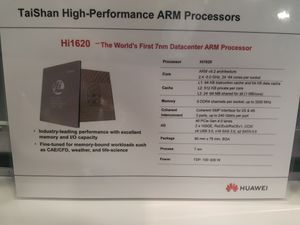From WikiChip
Kunpeng 920 (Hi1620) - HiSilicon
| Edit Values | |
| Kunpeng 920 | |
| General Info | |
| Designer | HiSilicon, ARM Holdings |
| Manufacturer | TSMC |
| Model Number | Hi1620 |
| Part Number | Hi1620 |
| Market | Server |
| Introduction | September, 2018 (announced) January 7, 2019 (launched) |
| General Specs | |
| Family | Hi16xx |
| Series | Kunpeng 920 |
| Frequency | 2,400 MHz, 2,600 MHz, 3,000 MHz |
| Microarchitecture | |
| ISA | ARMv8 (ARM) |
| Microarchitecture | Custom |
| Technology | CMOS |
| Word Size | 64 bit |
| Cores | 64 |
| Threads | 64 |
| Max Memory | 512 GiB |
| Multiprocessing | |
| Max SMP | 4-Way (Multiprocessor) |
Kunpeng 920 (Hi1620) is a planned octatetraconta-core 64-bit ARM server microprocessor set to be introduced by HiSilicon in late-2018. Fabricated by TSMC on a 7 nm process, this chip incorporates 64 custom cores operating at 2.4-3 GHz with a TDP of up to 200 W. The Hi1620 supports up to 1 TiB of octa-channel DDR4-3200 memory.
Cache
- Main article: Ares § Cache
|
Cache Organization
Cache is a hardware component containing a relatively small and extremely fast memory designed to speed up the performance of a CPU by preparing ahead of time the data it needs to read from a relatively slower medium such as main memory. The organization and amount of cache can have a large impact on the performance, power consumption, die size, and consequently cost of the IC. Cache is specified by its size, number of sets, associativity, block size, sub-block size, and fetch and write-back policies. Note: All units are in kibibytes and mebibytes. |
|||||||||||||||||||||||||||||||||||||
|
|||||||||||||||||||||||||||||||||||||
Memory controller
|
Integrated Memory Controller
|
||||||||||||||||
|
||||||||||||||||
Expansions
Expansion Options |
|||||||||||
|
|||||||||||
Features
[Edit/Modify Supported Features]
|
Supported ARM Extensions & Processor Features
|
||||
|
||||
Utilizing devices
- HiSilicon D06
- TaiShan 5280
- TaiShan 5290
- TaiShan X6000
This list is incomplete; you can help by expanding it.
Bibliography
- Huawei, Supercomputing 2018
- Huawei. (January 7, 2018). [press release] "Huawei Unveils Industry's Highest-Performance ARM-based CPU Bringing Global Computing Power to Next Level".
Facts about "Kunpeng 920-6426 - HiSilicon"
| Has subobject "Has subobject" is a predefined property representing a container construct and is provided by Semantic MediaWiki. | Kunpeng 920-6426 - HiSilicon#pcie + |
| base frequency | 2,400 MHz (2.4 GHz, 2,400,000 kHz) +, 2,600 MHz (2.6 GHz, 2,600,000 kHz) + and 3,000 MHz (3 GHz, 3,000,000 kHz) + |
| core count | 64 + |
| designer | HiSilicon + and ARM Holdings + |
| family | Hi16xx + |
| first announced | September 2018 + |
| first launched | January 7, 2019 + |
| full page name | hisilicon/kunpeng/920-6426 + |
| has ecc memory support | true + |
| instance of | microprocessor + |
| isa | ARMv8 + |
| isa family | ARM + |
| l1$ size | 8,192 KiB (8,388,608 B, 8 MiB) + |
| l1d$ size | 4,096 KiB (4,194,304 B, 4 MiB) + |
| l1i$ size | 4,096 KiB (4,194,304 B, 4 MiB) + |
| l2$ size | 32 MiB (32,768 KiB, 33,554,432 B, 0.0313 GiB) + |
| l3$ size | 64 MiB (65,536 KiB, 67,108,864 B, 0.0625 GiB) + |
| ldate | 3000 + |
| manufacturer | TSMC + |
| market segment | Server + |
| max cpu count | 4 + |
| max memory | 524,288 MiB (536,870,912 KiB, 549,755,813,888 B, 512 GiB, 0.5 TiB) + |
| max memory bandwidth | 190.7 GiB/s (195,276.8 MiB/s, 204.763 GB/s, 204,762.566 MB/s, 0.186 TiB/s, 0.205 TB/s) + |
| max memory channels | 8 + |
| max sata ports | 2 + |
| max usb ports | 4 + |
| microarchitecture | Custom + |
| model number | Hi1620 + |
| name | Kunpeng 920 + |
| part number | Hi1620 + |
| series | Kunpeng 920 + |
| smp max ways | 4 + |
| supported memory type | DDR4-3200 + |
| technology | CMOS + |
| thread count | 64 + |
| used by | HiSilicon D06 +, TaiShan 5280 +, TaiShan 5290 + and TaiShan X6000 + |
| word size | 64 bit (8 octets, 16 nibbles) + |

